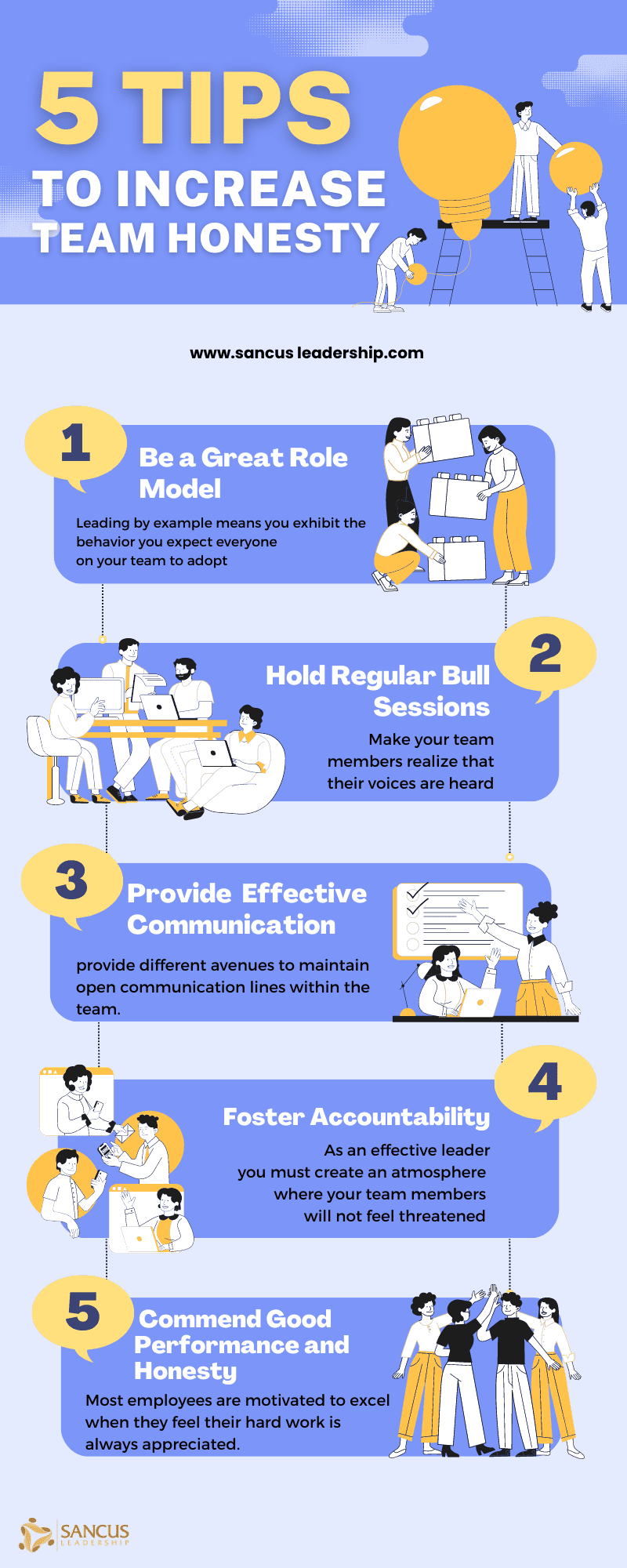Establishing honesty and trust within the team is crucial to your business’s survival, growth, and success. These affect the team’s productivity and how harmoniously and efficiently everyone can work toward common goals. Unfortunately, people often lie at work to protect their interests, preserve relationships, and avoid facing the consequences of their actions, so dishonesty must be effectively countered.
The most straightforward strategy to increase team honesty is being a good role model and showing your team that being truthful is the safest and best path. Being honest shows a person’s integrity, so consistently rewarding direct employees. Recognize publicly so the entire team is motivated to follow suit.
In this article, we will talk about how you can encourage your team to be more honest, starting by being a great role model for them and displaying the type of behavior and mindset you would like them to adopt. We will also discuss how simple tactics like regular bull sessions, suggestion boxes, active listening, and public recognition of honesty can help your team embrace the value of integrity. Let’s start!
How Do You Build Honesty in a Team?

You can build honesty in a team by exemplifying the behavior and character you want them to espouse. Strive to uphold high moral and ethical standards and show your team that being truthful is always the safest and wisest route. Listen actively when they speak up and openly reward honesty. Don’t punish honest mistakes.
Here are some of the simplest ways you can foster honesty in your team:
1. Be a Great Role Model

Leading by example means you exhibit the behavior you expect everyone on your team to adopt. As a leader, your team looks up to you and sees your behavior and outlook as the gold standard in business (if done correctly). Some will try to emulate you, especially those aiming to advance significantly in their careers.
Leading by example means you exhibit the behavior you expect everyone in your team to adopt.
Leading and managing a team calls for you to have high ethical and moral standards, and one of the ways you can show this is by always being honest with your team. Always be upfront when sharing feedback with your team members.
Don’t hesitate to call out inappropriate behavior. Always commend excellent performance.
Being open and truthful will give your team members a clearer view of your standards and expectations. It will also encourage them to voice their ideas straightforwardly because they know you support transparency.
2. Hold Regular Bull Sessions
I can’t stress enough how important it is to listen when the team shares feedback and opinions actively. This shows them you value their input and will inspire them always to maintain open communication lines within the team.

Bull sessions — informal group discussions — are great ways to loosen up the team and make each member feel they are an integral part of the group. Invite team members to offer suggestions on how to tackle particularly challenging situations. You can take these casual meetings as opportunities to update the team on the latest goings-on in the business, even not-so-good news.
You can also invite team members to interact, debate, and discuss relevant issues with each other. Encourage everyone to share their opinions, ideas, and suggestions. Invite them to openly discuss any possible problems within the group and settle disputes through healthy dialogues.
Make your team members realize that their voices are heard, their inputs are valued, and they’re not mere workers who are expected only to do what they are told.
These regular meetings will also help dispel any ill feelings within the group, especially those caused by misunderstandings and inaccurate conjectures.
I have used informal settings to solve many problems on my old team; most of the time, the team doesn’t even see it as a meeting, merely a time to discuss exciting topics.
Open communication lines within the team will help prevent a culture of negativity and rumor-mongering.
3. Provide Multiple Avenues for Effective Communication

Only some people are comfortable with speaking up. Some people would much rather air out their ideas and feedback through other means, so provide different avenues to maintain open communication lines within the team.
I worked with a guy for five years, he rarely voiced his opinion publicly, and it didn’t bother me. Instead, I would quickly talk with him after the meetings and ask his opinion.
Most times, the answer was that he didn’t have much to add (being quiet when you don’t have anything to add is a rare skill), and sometimes he would have pieces of gold to offer.
Here are some other ways you can encourage team members to “speak up:”
- Place a suggestion box in strategic locations in the office. This is so people who want to stay anonymous can do so, but you should question why people need to be anonymous.
- Create a separate email account. Set up a different account where your team members can send you feedback, opinions, and ideas. Having this separate from your official business account can help filter team-related information so you can address them sooner and minimize the risk of these messages getting overlooked.
4. Foster Accountability

Adversity is an unavoidable part of running a business. It’s okay to be daunted and overwhelmed when faced with seemingly insurmountable obstacles, but it is essential always to be willing and capable of overcoming them. As a leader, take it upon yourself to teach this concept to your team.
Along with this positive outlook on facing challenges is the value of accountability. Establishing the importance of being responsible for one’s actions and decisions is crucial, especially when these affect the entire team. As an effective leader, you must create an atmosphere where your team members will not feel threatened or ostracized when they own up to their shortcomings and mistakes.
Effectively leading and managing a business means instilling the value of always working together as a team through all the ups and downs. When faced with challenges, encourage a healthy exchange of ideas to help address the situation. Allow the erring team member to step up to the plate and lead the team in turning an adverse scenario into one that propels the team closer to attaining goals.
Effectively leading and managing a business means instilling the value of always working together as a team through all the ups and downs.
Among the main reasons employees lie in the workplace is the fear of being misjudged, shut out, and ridiculed, especially when they show vulnerability. By being a considerate, level-headed, rational leader, you encourage your team members not to be afraid of making mistakes — and owning up to them — because they know the entire team always has their back.
5. Openly Commend Good Performance and Honesty


Most employees are motivated to excel when they feel their hard work is always appreciated. One way to boost your team members’ morale is by openly commending them for excellent performance. This will encourage your team to always give their best effort in everything they do and be always inspired to choose to do what’s right even when nobody’s watching.
In this aspect, you’ll be taking honesty to a whole new level by ingraining integrity in your team. Businesses with a culture of honesty and integrity comprise team members with strong moral standards, high ethics, and a clear sense of what’s wrong and right. Leading and managing a team will become more straightforward when leaders fully trust their team.
What better way to increase team honesty than to reward team members who exhibit this notable trait? Make it a point to recognize team members often publicly and persistently so that the entire team realizes that honesty is always the safest and best route.
| Strategy | Description |
| Be a Great Role Model | Exhibit the behavior and outlook you expect your team to adopt, and always be honest with your team. |
| Hold Regular Bull Sessions | Listen actively to feedback and opinions from your team, value their input, and maintain open communication lines within the team. |
| Provide Multiple Avenues for Effective Communication | Offer different ways for team members to air out their ideas and feedback, such as suggestion boxes and a separate email account. |
| Foster Accountability | Establish the importance of being responsible for one’s actions and decisions, encourage a healthy exchange of ideas to address challenges, and create an atmosphere where team members can own up to their mistakes. |
| Openly Commend Good Performance and Honesty | Boost team morale by recognizing and rewarding team members who exhibit honesty and integrity, and make honesty an ingrained value in your team’s culture. |
Simon Sinek, in this talk, explains the importance of creating an environment where people are encouraged to be honest so they can work at their natural best.



